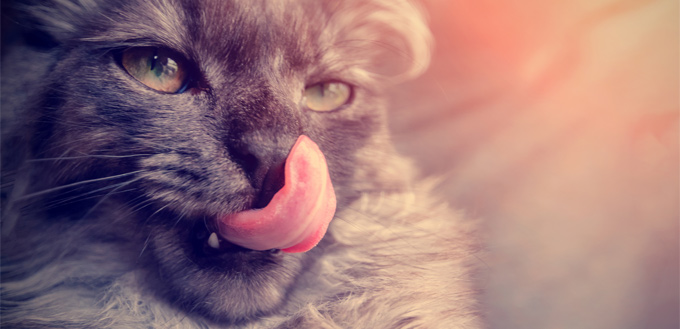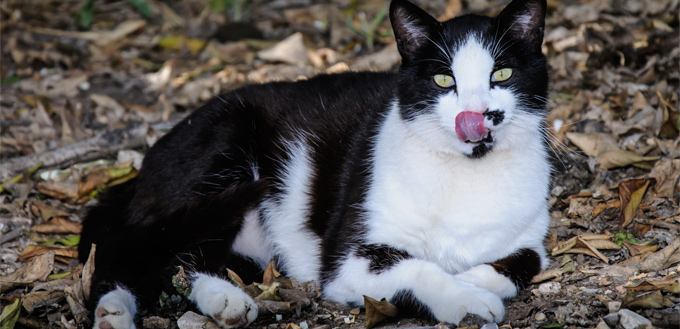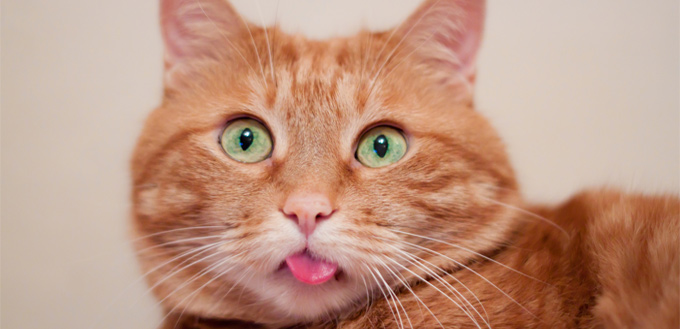We have always heard how “Cats rule and dogs drool.” As far as the saying goes it’s usually true, or at least, most of the time it is. Cats aren’t really known for drooling, but if they do, there must be a serious problem behind it. Have you recently been noticing your cat drooling? If so, it needs immediate care since it is a genuine problem.
However, just so you don’t panic at the unknown, there are certain reasons we’ve listed as for why your cat might be drooling:
- Pathological conditions, which results in inflammation
- Dental problems
- Kidney failure
- Trauma
- Cancer
- Foreign bodies
- Emotional stimuli
- Plant poisoning
A severely drooling cat is a rare sight since their mouth contains a very small amount of saliva. However, excessive drooling needs a thorough check-up at the vet. Sometimes there are serious causes of it and an early diagnosis is always the best idea.

Normal Drooling
For some of them, it’s common to drool while they are purring or kneading. It’s often a sign that they are relaxed and content, which often takes them back to their kittenhood. During the time of their nursing, kittens usually knead on their mother with their paws to stimulate milk release. This behavior result in a comforting and pleasant meal as well as a nourishing bond between them and their mother. After reaching adulthood, the feeling of contentment leads to kneading that stimulates drooling and thus brings back their memory of nursing. And about purring, it often accompanies with the kneading and drooling too.
So, if your perfectly healthy cat drools a little bit while “making the pizza dough” on your lap, don’t be surprised. That’s possibly also a way your cat is showing their compassion towards you. Different from canines, cats don’t really drool over food. However, it’s not abnormal for this to happen. If your cat drools over the smell of your freshly baked muffins or other food, but not specifically at other times, then it’s nothing to worry about.
It’s mostly stresses and fear that cause a cat to drool for some time. But if they seem very stressed over something on a regular basis and that results into drooling, it’s always a good idea to pay a visit to the vet.
Abnormal Drooling
This has got to be serious if your cat is drooling constantly and you cannot associate this with food or contentment. It’s essential for pet parents to take their cats to the vet at least once in a whole year for a routine check-up, even if they are not showing any signs of illness. Normally, expert vets can detect any internal problems before your cat could even start showing signs of it.
In that case, if you feel that the drooling behavior is slightly abnormal to occur in your cat, contact the vet right away. Your cat needs to a thorough check-up to examine any health issues that are causing them to drool.
Read ahead to know a detailed analysis of this underlying cause:
Dental Problems Causing to Drool
Cat Odontoclastic Resorptive Lesions or FORL is often a common cause of dental problems in cats. This causes drooling as well as serious oral pain. FORL, sometimes also called cervical line erosions, neck lesions, cavities, and internal or external root resorptions can even occur at the point where the tooth and the gum line meet. At times, you’ll notice a red line along your cat’s gum, which is regarded as FORL. On the other hand, if your cat has a lot of tartar (or hardened plaque) over their tooth, it would hide the gum lesion. Know that FORL is extremely painful and often leads to mouth sensitivity, drooling, and fractures of the tooth. If not treated, it will lead to chronic pain and drastic weight loss in your cat.
Kidney Failure
Kidney failure is a killer! It can either be seen in chronic or acute conditions. Chronic renal failure (CRF) or chronic kidney injury (CKI) is likely to result in significant drooling, clinical weight loss, increased urination, bad breath, and increased thirst. The kidney, when functioning normally, filters creatinine and BUN (two of the waste products of your cat’s body) out. When there is excessive growth of these products in the bloodstream, they will result in uremic ulcers in the mouth, stomach and oesophagus. By any chance, if you notice that your fluffy friend is showing clinical signs of CRF, take them to the vet ASAP. Your vet will then treat with:
- Bloodstream observation
- Intravenous therapy
- Stomach protectants
- Medication
- Low protein diets
Check out our article on Cat Food for Kidney Disease.
Foreign Bodies
Check your cat’s mouth every now and then. Look for stuff like a piece of string or a tiny object that might be stuck in their mouth. Normally, these small objects cause discomfort, and thus due to that, they might drool. Especially, if your fluffy friend stays outside most of their time, they are prone to swallowing grass, plants, small fish bones or other rubbish that remain in their mouth or esophagus. They might try to vomit the object as is painful to swallow normally. A frequent check on these will keep your pet cat away from such distress that may lead to drooling.
Heatstroke
This is common for cats that live in hot summer countries. Cats are specifically drawn to get caught with heatstroke than other animals because they spend most of their time out sitting under the sun without drinking enough water. On that account, they drool. Heatstroke is undoubtedly dangerous, hence, make sure to keep plenty of fresh and clean water available at all times.
If possible, try to keep your pet indoors, under the shade, where it’s likely to be cooler on hotter days. In tune, restlessness, rapid palpitation and breathing problems, vomiting, red tongue and lethargy are also potential signs of heatstroke. If you suspect that your cat may be suffering heatstroke, take them to the vet at the earliest possible moment.
Nausea and Anxiety
Nausea usually signals temporary stomach upset to some more critical, like intestinal cancer or inflammatory bowel disease. Hence, drooling might be a sign of any of these too. This again brings back to the conclusion that if their drooling lasts more than quite a few minutes and has become a more regular habit in your cat, it’s time for a veterinary exam.

Trauma
Cats are pretty vulnerable creatures. And if you’re keeping them as your companion, you should really take care of the fact that they are safe inside your house. Keeping them outdoors maximize any risk of trauma such as, getting attack by a big dog or happen to get hit by a car. Cat care specialists say that cats develop something called “jawbone fracture” after going through trauma. As a result, a dislocated tempo mandibular joint or as frequently known as “jawbone fracture” leads to severe drooling (due to their incapability to close their mouth). If that triggers you, consult your vet and get x-rays and other oral exams done.
Cancer/Oral Cancer
Are you the parent of a snow-white cat? Unfortunately, they are more at risk for thriving an aggressive, malignant cancer called Squamous Cell Carcinoma (SCC). Snow-white cats lack pigmentation for which they are likely to develop SCC near their ears, eye and mouth areas. If you or anyone in your house is a smoker, your cat is more likely to get caught with oral cancer. For all that, clinical signs of SCC in the mouth include:
- Drooling
- Not eating
- Bad breath
- Not being able to catch food with their mouth
- Weight loss
- Unable to close their mouth
Poisonous Plants
It’s no surprise that cats are allergic to certain plants, specifically the ones that contain insoluble calcium oxalate crystals. This causes extreme burning in the mouth if accidentally swallowed by your cat. Calla Lilly, Dieffenbachia, Peace Lilly, Elephant ear plant and umbrella plants are all example of plants that your cat may be allergic to.
Luckily, insoluble calcium oxalate plants are not much poisonous to cats but still results in excessive drooling. If your instincts tell you that your cat has taken in any such plants, flush it out gently with water and provide them with some tasty cat treats or chicken broth, canned tuna, etc. A thorough check-up with the vet is not necessary unless your cat vomits and show signs of inappetence. With that being said, make sure that it wasn’t a much deadlier plant like the Easter Lilly.
Motion Sickness
Surely you don’t move your cat in your car as much as you take your canine out for car rides – unless your fluffy friend has a vet appointment or going for shots. Believe it or not but these trips are a nightmare for your kitty, making her feel nauseated and nervous. Panting, difficulty in breathing, open-mouth, signs of anxiety may cause her to drool. Try to make your kitty feel comfortable by putting her in the cat carrier and in the back-seat without driving anywhere. Repeat this and slowly work up to driving around the block of your area. Your kitty will gradually get used to this and this will indeed ease her carsickness.
Stress
You must be aware that stress in cats is the most important factor of discomfort. One of the prime symptoms that your kitty is overly stressed is drooling. Why? Because when something creates excessive fear in your cat, their neurological system sends them a chain of orders as a shield against situations that they cannot control. One such signal could be drooling. In accord, they will also show signs like lack of appetite, diarrhea, lack of hygiene and sweaty paws. Although, it might be a neurological problem, do take them to an expert for proper diagnosis.
Prevent Drooling in Cats
Just like you brush your teeth, brush your cat’s teeth too. This would prevent any plaque or tartar from arousing bacteria that would lead to gum inflammation (ouch!). Plus, have you been giving too many treats to your cat lately? Of course, you are allowed to do that, but keep in mind that it can lead to abscessed teeth if you don’t brush their teeth frequently.
Read here our guide on Cat Toothbrush.
Another great idea would be to try using a chicken or fish-flavored cat toothpaste (yes, they exist), along with a tiny fingertip toothbrush for your cat. If you’re trying to avoid toothbrushing too often, ask your vet about any fluoride solution that you can add to a pet fountain to keep their teeth squeaky clean.
Check out our review of Cat Water Fountains.
On the contrary, if your cat is a clean bill of health but still keeps drooling, you may consider bringing about some changes in their food or nutritional supplements. It could be because they are suffering from some periodontal diseases and that they need a little special care. It’s often wet food that helps elderly cats or toothless cats to moisten the food and gulp it down.
Treatment
Once you find out the root cause of your cat’s drooling, treatment becomes simple. It could be something as plain as a tooth extraction or complex as surgery or chemotherapy for oral cancer affected cats. However, emergency treatments for a poisoned cat include cleansing the toxin from their entire system, typically by induced vomiting, intravenous fluids or charcoal.
As mentioned above, Lillies are not at all friendly for cats and can instantly affect a cat’s kidneys. Therefore, constantly dripping IV fluids to force clean the toxin is necessary while monitoring to ensure that they are out of the danger. A pet hotline would recommend you to feed activated charcoal to your cat that would absorb any substances left in their stomach.

Bottom Line
Like us humans, cats too might drool for a number of reasons and it could be their reaction to different stimuli. A normal amount of drooling is healthy. It’s worrisome only when it starts occurring excessively and suddenly. Remember that your cat is a clean and sensitive creature. They don’t usually fall sick and start to drool. But if they do now, a visit to the vet is a must. Get your peace of mind by acting up early!
Did you brush your cat’s teeth in the last few weeks? If not, you should do it immediately before it is too late.
You can also help out the community and let us know how you’ve treated your little kitten’s drooling problem in the comments below!
Sources:
- Why Does My Cat Drool?, WebMD
- Heidi Kos-Barber, DVM, Why Is My Cat Drooling?, PetMD
Note: The advice provided in this post is intended for informational purposes and does not constitute medical advice regarding pets. For an accurate diagnosis of your pet's condition, please make an appointment with your vet.







